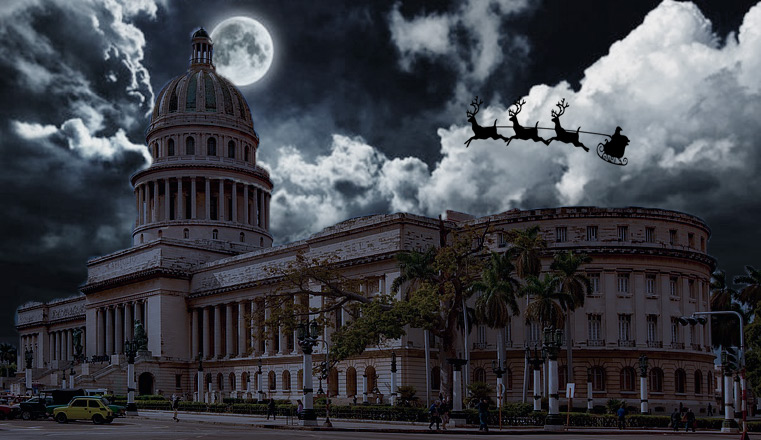
BREAKING NEWS: North Pole spokeself Mr. Elf E. McElfface contacted Export Law Blog with unsettling information. Apparently Donner and Blitzen are under the weather meaning that Santa will have to make his annual Christmas Eve run with six reindeer instead of his normal complement of eight. As readers will recall from the Press Release posted below back in 2016, OFAC’s rules were amended to permit Santa to visit both the United States and Cuba, provided that he went to Cuba first and only gave Cuban children EAR99 gifts. Otherwise, he would be landing in the United States with a sleigh containing toys in which Cuban children had an interest in violation of section 515.207(b) which was not waived by section 515.550(b).
Santa is concerned that requiring the reindeer to fly over the United States from the North Pole to Cuba and then back to the United States will unduly strain the six reindeer that will be making the run. Mr. McElfface pointed out that none of us, including the reindeer who are somewhere around three hundred years old (except for Rudolph who is 262 years old), are getting any younger. So, although Santa and the six healthy reindeer will do their best under these constraints, children in the United States should be prepared that this year there may be nothing (not even a lump of coal) under the tree for them. A GoFundMe campaign is in the works to purchase several tons of coal to be delivered to OFAC should any U.S. children be impacted by OFAC’s Cuba First rules for Santa.
FOR IMMEDIATE RELEASE
MEDIA CONTACT: Elf E. McElfface, [email protected] or (951) 262-3062Santa’s Village, North Pole – Santa Claus today, on behalf of himself, Mrs. Claus and the 40,000 elfployees of the Santa Foundation, expressed his gratitude to the Office of Foreign Assets Control for its timely revision of its rules to grant Santa clear authority this year to visit children both in the United States and Cuba. For years, Santa’s efforts to bring holiday cheer to children of both countries has been thwarted by section 515.207 of the Cuba regulations which would prohibit Santa’s sleigh from landing in the United States while toys for Cuban children remained in the sleigh or in landing in the United States if those toys had been delivered to Cuban children first.
Today’s action waives these restrictions if Santa’s sleigh only carries items that would, if they were subject to the EAR, be EAR99 or controlled only for AT reasons. This ends the long struggle over whether teddy bears and other toys — which are not food, medicine, or personal communications devices — could only be delivered to Cuban children in wrapped parcels with the child’s name and address written on the outside and with the statement “GIFT—Export License Not Required” also marked on the parcel package. Notwithstanding the diligence and timely efforts of Santa’s elfployees, compliance with these requirements for each non-naughty child in Cuba has heretofore been impossible.
News of the OFAC announcement led to loud cheers and applause throughout Santa’s Village. Elf E. McElfface, Santa’s spokeself, wiped a tear of joy from his eye as he said to the elves in one of Santa’s workshops that he never believed that this would occur in his lifetime, which was saying a lot given that the average life expectancy of an elf on the North Pole is currently just over 500 years.
As Christmas approaches, Santa said that he was looking forward to this year’s delivery of toys and goodies to the nice children throughout the world more than ever before and reminded children everywhere, both in Cuba and the United States, that they could call his hotline at +1 (951) 262-3062 to leave their Christmas wishes and toy requests.
This press release may include predictions, estimates or other information that might be considered forward-looking. While these forward-looking statements represent the Santa Foundation’s current judgment on what the future holds, they are subject to risks and uncertainties that could cause actual results to differ materially. You are cautioned not to place undue reliance on these forward-looking statements, which reflect our opinions only as of the date of this press release. Please keep in mind that we are not obligating ourselves to revise or publicly release the results of any revision to these forward-looking statements in light of new information or future events.

 Posted by
Posted by  Category:
Category: 

![Haskell Free Library and Opera House by Thomsonmg2000 via Wikimedia Commons https://commons.wikimedia.org/wiki/File:HaskellFreeLibraryandOperaHouse.JPG [Public Domain CC0] title=](https://www.exportlawblog.com/images/haskell.jpg)
![VNIEFF via http://www.vniief.ru/en/resources/2d252b804af3374599869d5b6de8bab2/12.jpg [Fair Use] VNIEFF via http://www.vniief.ru/en/resources/2d252b804af3374599869d5b6de8bab2/12.jpg [Fair Use]](https://www.exportlawblog.com/images/vniief.jpg)
![Novichok Vodka via https://www.rt.com/business/426529-novichok-brand-russia-business/ [Fair Use] Novichok Vodka via https://www.rt.com/business/426529-novichok-brand-russia-business/ [Fair Use]](https://www.exportlawblog.com/images/novichok.jpg)
![Image via https://pixabay.com/p-1202440/?no_redirect [Public Domain] Image via https://pixabay.com/p-1202440/?no_redirect [Public Domain]](https://www.exportlawblog.com/images/cuba_cars.jpg)


